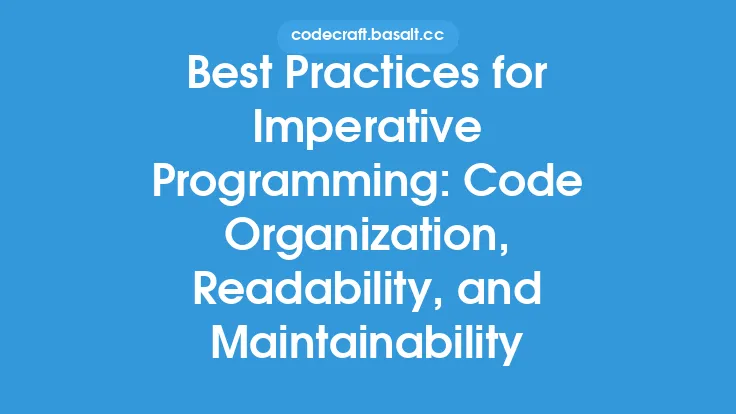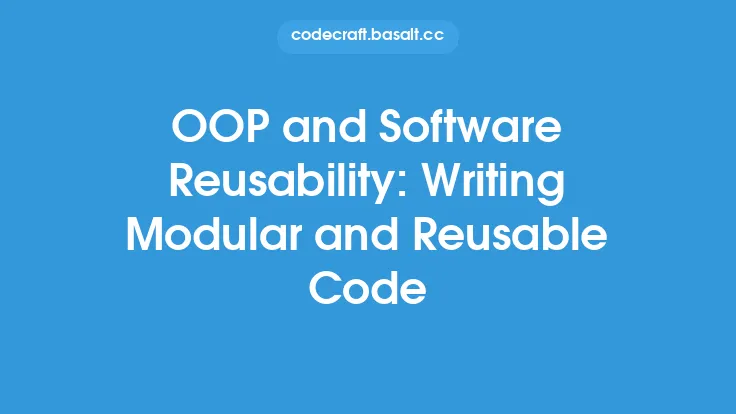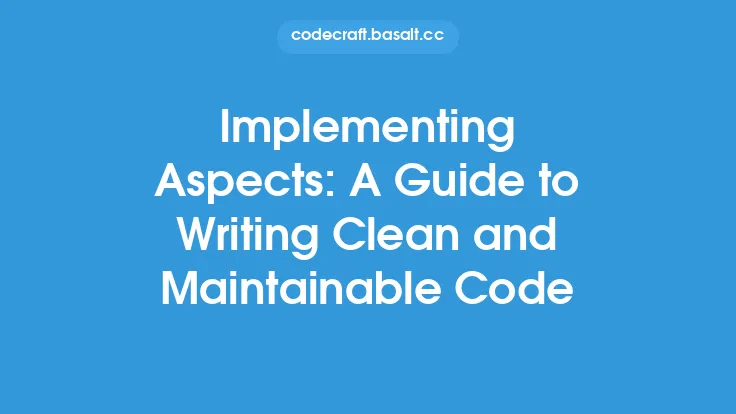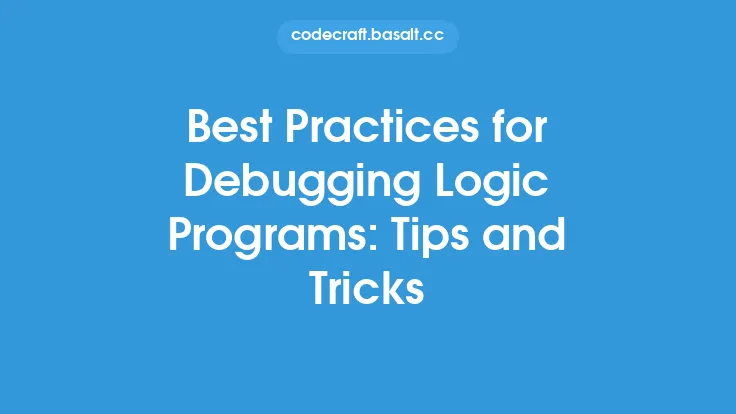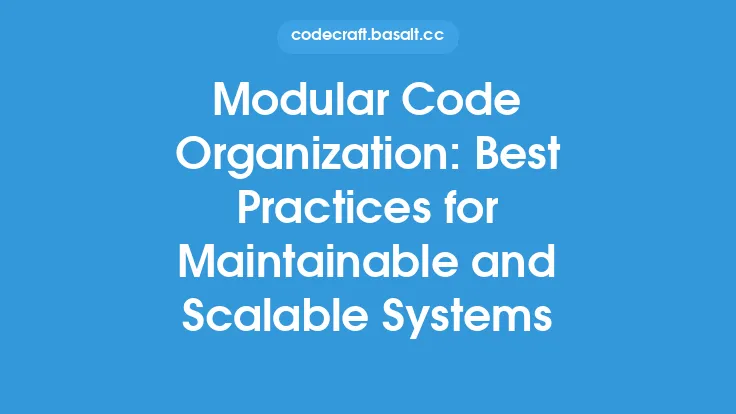When it comes to writing clean and readable object-oriented programming (OOP) code, there are several best practices that developers should follow. These practices not only make the code easier to understand and maintain but also improve its overall quality and scalability. In this article, we will explore some of the most important best practices for writing clean and readable OOP code.
Understanding the Importance of Clean Code
Clean code is essential in OOP because it makes the codebase more maintainable, scalable, and efficient. When code is clean, it is easier to understand, modify, and extend, which reduces the time and effort required to make changes or add new features. Clean code also reduces the likelihood of bugs and errors, which can save a significant amount of time and resources in the long run. Furthermore, clean code makes it easier for developers to collaborate and work together on a project, as it provides a clear and consistent understanding of the codebase.
Naming Conventions and Coding Standards
One of the most critical aspects of writing clean and readable OOP code is following a consistent naming convention and coding standard. This includes using meaningful and descriptive names for classes, methods, and variables, as well as following a standard convention for indentation, spacing, and formatting. For example, in Java, it is common to use camelCase for variable and method names, while in C#, it is common to use PascalCase. Consistent naming conventions and coding standards make the code easier to read and understand, as they provide a clear and consistent visual structure.
Commenting and Documentation
Commenting and documentation are essential for writing clean and readable OOP code. Comments provide a clear explanation of what the code is doing, why it is doing it, and how it works. This makes it easier for developers to understand the code and make changes or modifications as needed. Documentation, on the other hand, provides a high-level overview of the codebase, including its architecture, design, and functionality. This makes it easier for developers to navigate the codebase and understand how different components work together. When commenting and documenting code, it is essential to be concise and accurate, as excessive or misleading comments can make the code more difficult to understand.
Code Organization and Structure
The organization and structure of the code are critical for writing clean and readable OOP code. This includes organizing classes and methods into logical packages or namespaces, as well as using a consistent structure for classes and methods. For example, it is common to use a separate package or namespace for each logical component of the application, such as data access, business logic, or user interface. Within each package or namespace, classes and methods should be organized in a logical and consistent manner, such as alphabetically or by functionality. This makes it easier for developers to navigate the codebase and find the code they need.
Method Length and Complexity
Method length and complexity are essential factors to consider when writing clean and readable OOP code. Methods should be short and focused on a single task or functionality, as this makes them easier to understand and maintain. Long and complex methods can be difficult to read and understand, as they often contain multiple conditional statements, loops, and nested logic. When methods are too long or complex, it is often better to break them down into smaller, more focused methods, each with its own specific responsibility. This makes the code more modular and easier to maintain.
Variable and Parameter Naming
Variable and parameter naming are critical for writing clean and readable OOP code. Variables and parameters should have meaningful and descriptive names that indicate their purpose and functionality. For example, instead of using a variable named "x", it is better to use a variable named "customerName" or "orderTotal". This makes the code easier to read and understand, as it provides a clear indication of what the variable or parameter represents. When naming variables and parameters, it is essential to avoid using abbreviations or acronyms, as these can be confusing and difficult to understand.
Error Handling and Exception Management
Error handling and exception management are essential for writing clean and readable OOP code. Errors and exceptions should be handled in a consistent and logical manner, as this makes the code more robust and reliable. When handling errors and exceptions, it is essential to provide clear and descriptive error messages, as these make it easier for developers to diagnose and fix problems. It is also essential to avoid using generic or catch-all exception handlers, as these can make it difficult to diagnose and fix problems. Instead, it is better to use specific exception handlers that catch and handle specific exceptions, such as IOException or SQLException.
Code Reviews and Pair Programming
Code reviews and pair programming are essential for writing clean and readable OOP code. Code reviews provide a formal process for reviewing and evaluating code, as well as providing feedback and suggestions for improvement. Pair programming, on the other hand, provides a collaborative approach to writing code, as two developers work together to write and review code. Both code reviews and pair programming make the code more maintainable and scalable, as they provide a clear and consistent understanding of the codebase. When conducting code reviews or pair programming, it is essential to be constructive and respectful, as this makes the process more effective and enjoyable.
Testing and Validation
Testing and validation are critical for writing clean and readable OOP code. Tests and validation provide a formal process for evaluating and verifying the code, as well as ensuring that it meets the required functionality and quality standards. When writing tests and validation, it is essential to use a consistent and logical approach, such as using a testing framework or validation library. Tests and validation should be automated, as this makes the process more efficient and effective. It is also essential to test and validate the code regularly, as this makes it easier to catch and fix problems early in the development process.
Refactoring and Code Smells
Refactoring and code smells are essential for writing clean and readable OOP code. Refactoring provides a formal process for evaluating and improving the code, as well as removing code smells and improving its overall quality. Code smells, on the other hand, provide a clear indication of problems or issues in the code, such as duplicated code, long methods, or switch statements with many cases. When refactoring and removing code smells, it is essential to be careful and methodical, as this makes the process more effective and efficient. It is also essential to refactor and remove code smells regularly, as this makes the code more maintainable and scalable.
Conclusion
In conclusion, writing clean and readable OOP code requires a combination of best practices, including following a consistent naming convention and coding standard, commenting and documenting code, organizing code into logical packages or namespaces, keeping methods short and focused, using meaningful and descriptive variable and parameter names, handling errors and exceptions in a consistent and logical manner, conducting code reviews and pair programming, testing and validating code, and refactoring and removing code smells. By following these best practices, developers can write clean and readable OOP code that is maintainable, scalable, and efficient.
